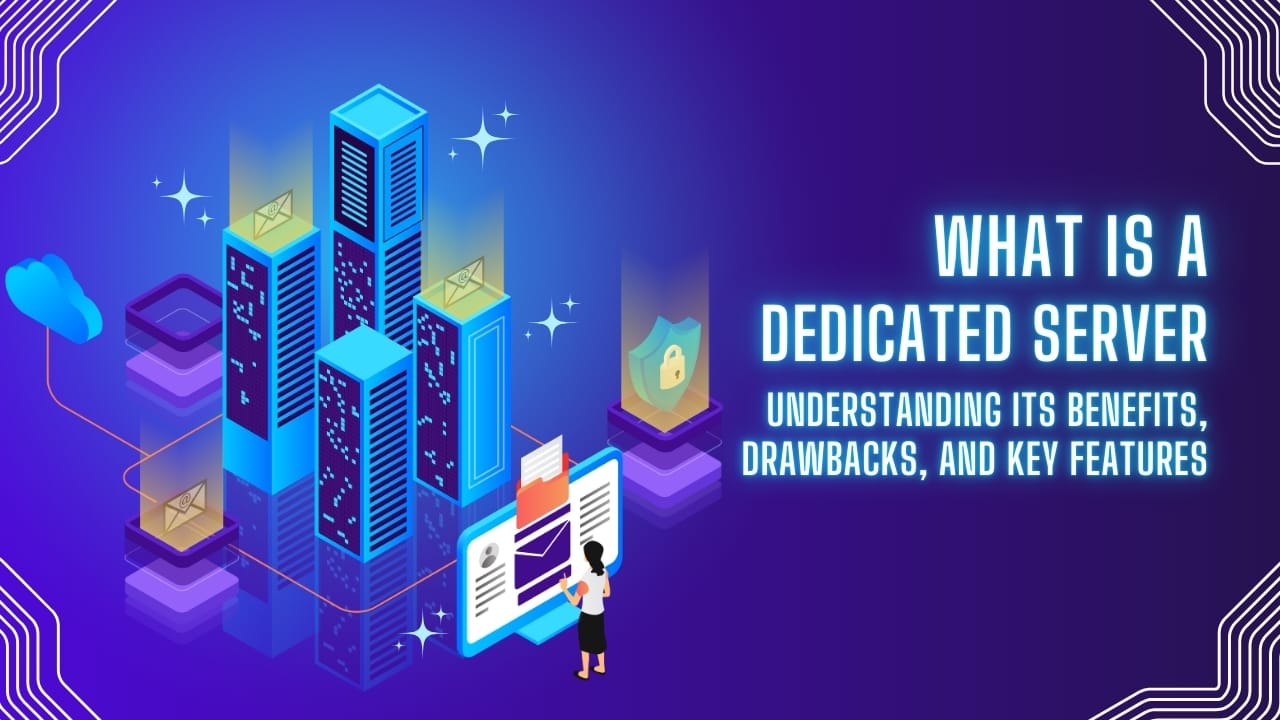Introduction to Dedicated Servers: A Complete Overview
In the internet society, the websites and internet application services need reliable and powerful hosting for the rising traffic load. When shared hosting, cloud and related platforms fall short, companies may opt for dedicated server. But what exactly is a dedicated server? In this article, we’ll explore what dedicated servers are, how they work, and their significant benefits and drawbacks.
Regardless of whether the endeavor is to launch a top-tier website for high traffic, to manage resources-intensive applications, to have overall maximum access control to the hosting environment, to be familiar with dedicated servers is information that deserves a serious look.
What is a Dedicated Server?

Dedicated server is a physical machine that is leased or owned by a single client only. In contrast to shared hosting where resources are shared among multiple users, a dedicated server provides dedicated hardware resources, such as CPU power, memory (RAM), storage, and bandwidth to the usage. This guarantees that the server, and only the server, has access to the full capacity of the server, allowing maximum user performance, usability, and customizability.
How Does a Dedicated Server Work?
Virtual machines operate on the basis that a client has complete control over the whole server environment. Generally, the servers are in a data center and access the web with uplink speed connections. (Users) can also set up the system running on the server, (install) specialized software, and even (modified) system hardware, if required. This degree of customization makes sure that there is the possibility of businesses to adapt the server to those individual requirements.
A dedicated server may run a website, a database, an application, or even a virtual machine. Users can also opt to use either managed or unmanaged hosting. The hosting provider manages the server maintenance, security and software upgrades in a managed setup. On the other hand, uncontrolled hosting requires the client to perform the tasks on his/her own.
Key Features of a Dedicated Server
Exclusive Resources
A dedicated server affords you complete control over processing power, memory, and storage, so you are no longer competing for space and resources with others.
Customization
You are free to install any software, adjust system parameters, and select an OS that is optimal for your purposes.
Enhanced Security
Exclusive access to the server makes them less susceptible to attacks by other users. Furthermore, you can apply security measures, such as firewalls and encryption, as well as tailor security parameters.
High Performance
Dedicated servers are designed for the speed and the reliability and are thus perfect for applications resource heavy or websites with great traffic.
Scalability
However, fixed resources are provided with dedicated servers, and such servers are also relatively scalable. Storage, RAM and bandwidth can be upgraded in the scale required for the growth of the business.
Must Read: What Is Shared Hosting in 2025? The Ultimate Beginner’s Guide to Web Hosting
Benefits of a Dedicated Server
1. Improved Performance and Speed
The high performance is one of the biggest advantages of adopting a dedicated server. As all the resources are directed to a single user, websites or applications run on specific servers can manage a significant amount of traffic without incurring deceleration. For companies experiencing a high demand or resource-consuming applications, this is revolutionizing.
Furthermore, the speed of these websites allows providing significantly faster load times, which can be beneficial for the end-user and can even lead to improved SEO performance, as the search engines prefer the loading speed of a site.
2. Better Security
For enhanced security, dedicated servers are better than shared hosting. Since you’re the only user on the server, there is a reduced risk of being affected by security vulnerabilities from other users, which is common in shared hosting environments.
In addition, you are allowed to install custom security features, including powerful firewalls, intrusion detection systems and secure data backups, to secure your data and infrastructure.
3. Complete Control and Customization
When you have a dedicated server, you have complete administrative control over the server instance, so you can apply any changes deemed necessary to the server’s configuration, operating system, or installed software. This level of control is perfect for companies with unique requirements.
In the case of, for example, the need to have certain software sets or use a bespoke CMS, on a dedicated server it is easier than on, for instance, Cloud computing services to set up your environment to the requirements of the business.
4. High Availability and Reliability
Fixed servers usually have high uptime guarantees, i.e., your website or application will be accessible all the time. High-availability systems (i.e., features that provide redundancy and backup power supplies) guarantee that your server keeps working despite the failure of a single component.
5. Enhanced SEO Performance
Search engines care very much about the UI experience, and the website loading speed is an important element which will decide the outcome of SEO rankings. A dedicated server means your website runs faster and more uptime, leading to better rankings and more organic traffic in the long run.
Also Read: Namecheap Hosting 2025: Low Cost, High Value? Let’s Find Out
Drawbacks of a Dedicated Server
1. High Cost
The biggest reason for having a and dedicated server is the cost. Due to their exclusive access to and ability to configure resources, dedicated servers are usually more expensive than shared hosting or cloud sharing solutions. For small businesses or startups, that may not be a feasible option because of a limited budget.
Price may depend on the degree of customization, the available resources, and whether the server is managed or unmanaged. Managed services cost more due to the provision of server maintenance, security updates, and more services.
2. Requires Technical Expertise
On the other hand, the customization facilities of dedicated servers is a major advantage but it also involves technical knowledge. If you choose to go with unmanaged hosting, you will have the responsibility for keeping the server updated, installing and maintaining updates, and debugging problems. This is a problem if you do not have an in-house IT department or the necessary technical capability.
Managed dedicated hosting can help alleviate this burden, as the service provider handles these tasks, at a price tag, though.
3. Longer Setup Time
Provisioning a dedicated server can occupy more time than another form of a hosting service. Customisations, installations, and security configurations will take longer. Although shared hosting platforms typically offer one-click installations, a dedicated server may need to be fully manually set up, and that might take multiple days depending on the complexity of it.
4. Underutilization of Resources
In case your website or application does not need all the capacity of a dedicated server, you can end up overpaying on the capacity that is actually needed. Shared hosting or virtual private servers (VPS) could be more affordable solutions for some small site or low traffic site.
Dedicated Server vs Shared Hosting vs VPS Hosting: A Quick Comparison
shared hosting and VPS (Virtual Private Server) hosting. The following table outlines the key differences:
| Feature | Dedicated Server | Shared Hosting | VPS Hosting |
|---|---|---|---|
| Resource Allocation | Fully allocated resources (CPU, RAM, etc.) | Shared among multiple users | Allocated but shared with other users |
| Performance | High, consistent performance | Limited, may slow down with traffic spikes | Moderate, but can be affected by neighbors |
| Security | Highest level, with custom security setups | Vulnerable due to shared resources | Moderate, more isolated than shared hosting |
| Customization | Full control over server and software | Very limited control | Moderate control, but not full flexibility |
| Cost | High, premium pricing | Low, most affordable option | Moderate, more expensive than shared hosting |
| Technical Expertise Needed | High, requires server management | Low, no technical skills needed | Moderate, requires some technical knowledge |
| Ideal For | High-traffic websites, e-commerce, custom apps | Small blogs, personal websites | Medium to high traffic sites, growing businesses |
Also Read: Liquid Web Hosting Review 2025: Unmatched Performance or Overpriced Solution?
Is a Dedicated Server Right for Your Business?
A server can provide great benefits, however it is not the right tool for all the businesses. For a small website with low traffic, shared hosting or VPS hosting could be more affordable. But for high-volume web site administration, resource-intensive applications or for who needs the highest level of direct control over their hosting environment, a dedicated server is an attractive option.
The following are a few cases in which a dedicated server is a good idea:.
- High Traffic Websites: In the event of fast growth or high volume of users, a website needs a dedicated server so that it can effectively perform tasks and does not slow down or have interruptions.
- E-commerce Sites: Security is a key concern for businesses based on e-commerce and handling personal identifiable information (PII). A dedicated server provides the necessary protection.
- Custom Web Applications: If you’re running a custom-built application or require specialized software configurations, a dedicated server gives you the flexibility to tailor the server environment.
- Large Databases: Web sites or applications using big databases available advantages with high read and write speeds, available from a specialized server, thus combining performance and reliability.
Conclusion
Dedicated server offers a robust solution for those who require high performance, security, and control. While they come at a higher price, the benefits they provide in terms of customization, speed, and security can justify the cost, particularly for large websites or applications with specific requirements.
Before deciding on a dedicated server, evaluate your business’s needs, traffic volume, technical expertise, and budget. With good management, your website can reap a wide positive impact from a dedicated server such as enhanced reliability, enhanced security, and enhanced user experience which lead to a wider and more profitable internet presence.



